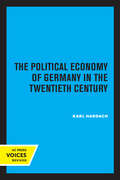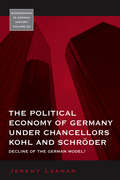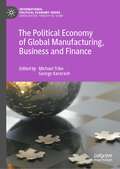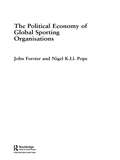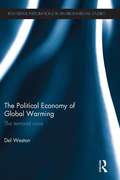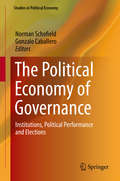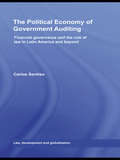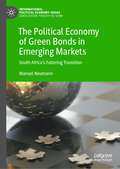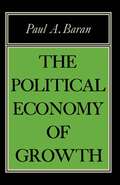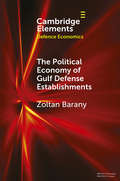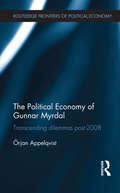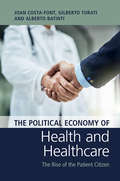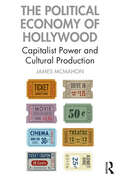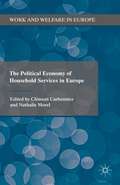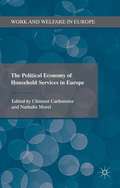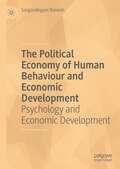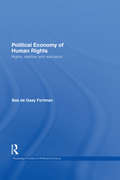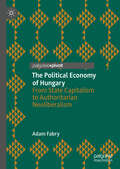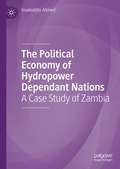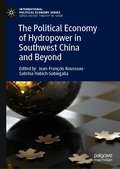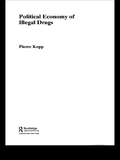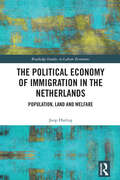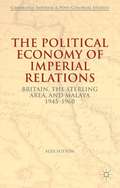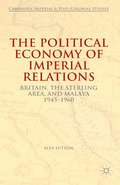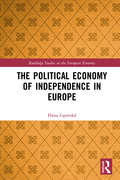- Table View
- List View
The Political Economy of Germany in the Twentieth Century
by Karl HardachThis title is part of UC Press's Voices Revived program, which commemorates University of California Press’s mission to seek out and cultivate the brightest minds and give them voice, reach, and impact. Drawing on a backlist dating to 1893, Voices Revived makes high-quality, peer-reviewed scholarship accessible once again using print-on-demand technology. This title was originally published in 1980.
The Political Economy Of Germany Under Chancellors Kohl And Schroder
by Jeremy LeamanWhile unification has undoubtedly had major effects on Germany's political economy, the pattern of current policy-making preferences was established at an earlier stage, in particular, at the beginning of the 'Kohl-era' in 1982. This essentially neo-liberal pattern can be seen to have dominated the modalities chosen to guide Germany through the process of unifi cation and was mirrored in developments in other OECD countries and in particular within the EU. This book demonstrates that the three policy imperatives (neo-liberal structural reform, European monetary integration, and unification) produced a policy-mix which, together with other structural economic and demographic factors, has had disappointing results in all three areas and hampered Germany's overall economic development.
The Political Economy of Global Manufacturing, Business and Finance (International Political Economy Series)
by Michael Tribe George KararachThis book is written as a tribute to Frederick Nixson’s extensive work on industrial development in the Global South, while seeking to actively engage with the latest arguments concerning development economics, together with changes in manufacturing and industrial policy that continue to shape the role of the Global South in the international economy, the impact of the increased concentration of global multinational corporations in that space, along with the rise of new financing tools and debt traps. The chapters pay homage to Fred’s broad view of the international development process and reflect his breadth of perception both theoretically and geographically. The book targets both the scholarly and policymaking audience.
The Political Economy of Global Sports Organisations (Routledge Frontiers Of Political Economy Ser. #Vol. 61)
by John Forster Nigel PopeAt the global level, sport is ruled by a set of organizations including giants such as the IOC (Olympics), FIFA (soccer), and the IAAF (athletics) as well as sporting minnows such as the World Armsport Federation (armwrestling). Many of these bodies have been surrounded by controversy during their histories, after having to adjust to the reali
The Political Economy of Global Warming: The Terminal Crisis (Routledge Explorations in Environmental Studies)
by Del WestonHumanity is facing an unprecedented global catastrophe as a result of global warming. This book examines the reasons why international agencies, together with national governments, are seemingly unable to provide real and binding solutions to the problems. The reasons presented relate to the existing dominant global economic structure of capitalism as well as the fact that global warming is too often seen as an isolated problem rather than one of a suite of exceptional, converging and accelerating crises arising from the global capitalist political economy. <P><P> This book adopts a political economy framework to address these issues. It accepts the science of global warming but challenges the predominant politics and economics of global warming. To illustrate the key issues involved, the book draws on South Africa – building on Samir Amin’s thesis that the country represents a microcosm of the global political economy. By taking a political economy approach, the book provides a clear explanation of the deep and pervasive problem of the denial which fails to acknowledge global warming as a systemic rather than a market problem. The book should be of interest to students and scholars researching climate change, environmental politics, environmental and ecological economics, development studies and political economics.
The Political Economy of Governance
by Norman Schofield Gonzalo CaballeroUnderstanding the governance of nations is a key challenge in contemporaneous political economy. This book provides new advances and the latest research in the field of political economy, dealing with the study of institutions, governance, democracy and elections. The volume focuses on issues such as the role of institutions and political governance in society, the working of democracy and the electoral performance in several case studies. The chapters involve cutting edge research on many different countries, including the USA, Great Britain, Germany, Spain and the Third World. The authors of the chapters are leading scholars in political economy from America, Europe and Asia.
The Political Economy of Government Auditing: Financial Governance and the Rule of Law in Latin America and Beyond (Law, Development and Globalization)
by Carlos SantisoThe Political Economy of Government Auditing addresses the elusive quest for greater transparency and accountability in the management of public finances in emerging economies; and, more specifically, it examines the contribution of autonomous audit agencies (AAAs) to the fight against corruption and waste. Whilst the role of audit agencies in curbing corruption is increasingly acknowledged, there exists little comparative work on their institutional effectiveness. Addressing the performance of AAAs in emerging economies, Carlos Santiso pursues a political economy perspective that addresses the context in which audit agencies are embedded, and the governance factors that make them work or fail. Here, the cases of Argentina, Brazil and Chile are examined, as they illustrate the three – parliamentary, court and independent – models of AAAs in modern states, and their three distinct trajectories of reform, or lack of reform. Beyond Latin America, considerations on the reform of government auditing in other countries, developed and developing are also taken up as, it is argued, while institutional arrangements for government auditing matter, political factors ultimately determine the effectiveness of AAAs. Reforming AAAs, it is concluded, must consider the trajectory of state building, the role of law in public administration and the quality of governance. An important contribution to the comparative study of governance institutions, and especially those tasked with overseeing the budget and curbing corruption, The Political Economy of Government Auditing will be of interest to scholars and students of comparative politics, development studies, administrative law, and public finance; as well as to development practitioners and policy-makers in developing countries, donor governments and international institutions.
The Political Economy of Green Bonds in Emerging Markets: South Africa's Faltering Transition (International Political Economy Series)
by Manuel NeumannFunding low-carbon transitions to address climate change is one of the major challenges of our time. Green bonds have emerged as a powerful tool to enlist institutional investors’ wealth for these transitions. But despite exponential growth in many parts of the world, the green bond market in South Africa has been stalling. This book project grapples with this puzzle. Firstly, it debunks some of the promises underpinning green bond markets and traces the manifold practices undergirding its promotion. Secondly, it identifies some barriers prohibiting the expansion of green bonds in emerging markets and zooms in on the depoliticizing tendencies a transition premised on financial innovation produces. Thirdly, this work discloses the idiosyncratic political economic challenges of a fossil-based economy in transition and shines a light on the competing elements of a ‘green’ and a ‘just’ transition. It argues that the limited uptake of green bonds can best be explained by the instrument’s inability to adequately incorporate the various demands levied on South Africa’s contested transition trajectory. In so doing, this book contributes important new qualitative insights into green bond markets-in-the-making and extends political economic scholarship on finance-led transition endeavors in emerging markets.Chapters 3 and 6 is available open access under a Creative Commons Attribution 4.0 International License via link.springer.com.
The Political Economy of Growth
by Paul A. BaranOne of the most influential studies ever written in the field of development economics, this book has, since first publication in 1957, bred a whole school of followers who are producing further works along the lines indicated by Baran. Concerned with the generation and use of economic surplus, it analyzes from this point of view both the advanced and the underdeveloped countries. A work in political economy rather than solely in economics, this book treats the economic transformation of society as one facet of a total social and political evolution.
The Political Economy of Gulf Defense Establishments (Elements in Defence Economics)
by Zoltan BaranyThe six monarchies on the Arabian Peninsula have devoted enormous sums to defense in past decades. Nevertheless, the gap between their expensive armaments and their capacity to deter aggression and/or project military strength has narrowed but little in that time. This Element takes a political economy approach and argues that structural factors inherent in the Gulf states' political systems prohibit civilian oversight of the defense sector and are responsible for this outcome. Lax restraints on military outlays, in turn, enable widespread corruption, lead to large-scale waste, and account for the purchasing of unneeded, unsuitable, and incompatible weapons systems. The Element explores the challenges caused by plummeting oil prices and the resulting budget cuts and considers the development of domestic defense industries in Saudi Arabia and the UAE, intended as a part of their economic diversification program. The setbacks of the Saudi-led coalition's on-going war in Yemen starkly illustrate the narrative.
The Political Economy of Gunnar Myrdal: Transcending Dilemmas Post-2008 (Routledge Frontiers of Political Economy)
by Örjan AppelqvistThe intellectual trajectory of Gunnar Myrdal, Swedish Nobel Laureate economist, sociologist, and politician, brings us through many of the major issues in the world economy and politics of the 20th century. This new volume explores Myrdal's work on three major themes: breaking away from conventional assumptions in Political Economy (and highlighting flaws that can still be found in today’s teachings on Political Economy); finding ways of re-creating Europe after WW II, including the discussions between liberal Americans and European social democrats on how to create a more cooperative and socially just international order; and understanding the impact or environmental concerns on growth and development, starting with Myrdal’s participation in the first UN Conference on Environment in Stockholm 1960 and continuing with his later writings. What is then the relevance of these themes today? In times when financial crisis threatens to block international and domestic economies, when the European Union’s promises of prosperity and cooperation seems to be severely threatened and when there is a large consensus that current modes of economic development are ecologically unsustainable: can we find ways of transcending seemingly intractable dilemmas? These questions will be discussed in the final part of the book.
The Political Economy of Health and Healthcare: The Rise of the Patient Citizen
by Joan Costa-Font Gilberto Turati Alberto BatintiThe healthcare sector is one of the fastest growing areas of social and public spending worldwide, and it is expected to receive an increase in government shares of GDP in the near future. Truly global in its scope, this book present a unified, structured understanding of how the design of a country's health institutions influence its healthcare activities and outcomes. Building on the 'public choice' tradition in political economy, the authors explore how patient-citizens interact with their country's political institutions to determine policies, alongside the influence of other forces, such as federalism, collective action, electoral competition, constitutional designs, political ideologies, corruption, lobbying and the dynamics of change. Whilst drawing on the theoretical concepts of political economy, this book describes the institution-grounded health systems in an accessible way. It will appeal to undergraduate and graduate students studying health economics, health policy and public policy.
The Political Economy of Hollywood: Capitalist Power and Cultural Production
by James McMahonIn Hollywood, the goals of art and business are entangled. Directors, writers, actors, and idealistic producers aspire to make the best films possible. These aspirations often interact with the dominant firms that control Hollywood film distribution. This control of distribution is crucial as it enables the firms and other large businesses involved, such as banks that offer financing, to effectively stand between film production and the market. This book analyses the power structure of the Hollywood film business and its general modes of behaviour. More specifically, the work analyses how the largest Hollywood firms attempt to control social creativity such that they can mitigate the financial risks inherent in the art of filmmaking. Controlling the ways people make or watch films, the book argues, is a key element of Hollywood’s capitalist power. Capitalist power—the ability to control, modify, and, sometimes, limit social creation through the rights of ownership—is the foundation of capital accumulation. For the Hollywood film business, capitalist power is about the ability of business concerns to set the terms that will shape the future of cinema. For the major film distributors of Hollywood, these terms include the types of films that will be distributed, the number of films that will be distributed, and the cinematic alternatives that will be made available to the individual moviegoer. Combining theoretical analysis with detailed empirical research on the financial performance of the major Hollywood film companies, the book details how Hollywood’s capitalist goals have clashed with the aesthetic potentials of cinema and ultimately stymied creativity in the pursuit of limiting risk. This sharp critique of the Hollywood machine provides vital reading for students and scholars of political economy, political theory, film studies, and cinema.
The Political Economy of Household Services in Europe (Work and Welfare in Europe)
by Clément CarbonnierThis edited volume assesses from a variety of perspectives the policies introduced to support the development of household services across Europe. It highlights the impact of these costly policies on the creation of low quality jobs and on labour market dualisation, and questions their social and economic outcomes.
The Political Economy of Household Services in Europe (Work And Welfare In Europe)
by Nathalie Morel Clément CarbonnierThe Political Economy of Household Services in Europe.
The Political Economy of Human Behaviour and Economic Development: Psychology and Economic Development
by Sangaralingam RameshThis book explores how economics can be based around studies on human behaviour, rather than relying on overly simplified assumptions generated from mathematical modelling. Through examining the link between human economic activity and psychology, specifically regarding the development of cognitive and non-cognitive ability, insight into the human dimensions of economic development and the sources of human inequality are provided.This book aims to question assumptions of rationality utilised in neoclassical economic theory and suggest how economic activity can be better understood through a deeper recognition of human behaviour. It will be relevant to students and researchers interested in the political economy and behavioural economics.
Political Economy of Human Rights: Rights, Realities and Realization (Routledge Frontiers Of Political Economy Ser.)
by Bas de Gaay FortmanThe plethora of literature produced over the past decade in response to the perceived failure of the human rights project to deliver results for billions of people living in ‘adverse’ environments has usually focused on international legal standards and mechanisms, with little regard for the root structural realities that constrain their implementation. Hence, a text that primarily focuses on the major challenge of realisation of human rights in the context of diverse realities is urgently needed. This book, then, provides an analytical as well as inspirational text on human rights from a contextual perspective; it offers a reconceptualisation of human rights as not merely legal resources, but political tools as well. After an introduction that familiarizes the reader with some of the key concepts used throughout, the book is divided into six chapters. The first two combine a critique of the overly legal use of human rights with a reconceptualisation of their potential as powerful tools outside of the legal context. The next two chapters examine the nature of the structural challenges that face realisation, both on the global and on the local level. The last two chapters analyse two major areas of the human rights deficit: the structural non-implementation of the rights of the poor and the failing protection of non-dominant collectivities. Finally, a concluding chapter elaborates on the main findings and insights gained. The book combines rigorous juridical study with a focus on political-economic analysis of rights in context. Hence, it aims at an interdisciplinary treatment of human rights as opposed to current texts that have a tendency to be monodisciplinary. The book should be of interest to students of human rights, political economy, law and conflict studies, as well as those who work or research in these areas.
The Political Economy of Hungary: From State Capitalism to Authoritarian Neoliberalism
by Adam FabryThis book explores the political economy of Hungary from the mid-1970s to the present. Widely considered a ‘poster boy’ of neoliberal transformation in post-communist Eastern Europe until the mid-2000s, Hungary has in recent years developed into a model ‘illiberal’ regime. Constitutional checks-and-balances are non-functioning; the independent media, trade unions, and civil society groups are constantly attacked by the authorities; there is widespread intolerance against minorities and refugees; and the governing FIDESZ party, led by Prime Minister Viktor Orbán, controls all public institutions and increasingly large parts of the country’s economy. To make sense of the politico-economical roller coaster that Hungary has experienced in the last four decades, Fabry employs a Marxian political economy approach, emphasising competitive accumulation, class struggle (both between capital and labour, as well as different ‘fractions of capital’), and uneven and combined development. The author analyses the neoliberal transformation of the Hungarian political economy and argues that the drift to authoritarianism under the Orbán regime cannot be explained as a case of Hungarian exceptionalism, but rather represents an outcome of the inherent contradictions of the variety of neoliberalism that emerged in Hungary after 1989.
The Political Economy of Hydropower Dependant Nations: A Case Study of Zambia
by Imaduddin AhmedThis book aims to inform better energy policy in hydropower dependent countries which are vulnerable to climate shocks. It focuses on the impact of increasing energy insecurity as global warming affects a fifth of the world population living in hydropower dependent countries facing drought. It uses Zambia as a case study.The book offers supply-side and demand-side recommendations at the national, continental, and global level and contains original data collected to highlight the impact of power outages on manufacturing firms.
The Political Economy of Hydropower in Southwest China and Beyond (International Political Economy Series)
by Jean-François Rousseau Sabrina Habich-SobiegallaThis book conceptualises the ongoing hydropower expansion in Southwest China as a socio-political and transnational project transcending the construction of dams. Chapters in this volume are organised around three sections spanning hydropower and resettlement governance, rural livelihoods, and international relations connected to China’s hydropower expansion. Dam projects of various scales are analysed as infrastructure projects that shape peoples’ livelihoods, the environment, and China’s relations with Southeast Asia, Africa, and Latin America.
Political Economy of Illegal Drugs (Routledge Studies In Crime And Economics Ser. #Vol. 1)
by Pierre KoppWith debates surrounding the decriminalisation of certain illegal drugs raging in many countries around the world, this new book is a timely and sober reflection on one of the biggest social problems facing the world at large. Of interest not only to economists, but also to criminologists and those involved in policy-making, The Economics of Illega
The Political Economy of Immigration in The Netherlands: Population, Land and Welfare (Routledge Studies in Labour Economics)
by Joop HartogEconomists measure the effects of immigration through the yardstick of income. This book offers a broad survey of the conventional approach but in addition, also considers better measures of welfare or well-being and provides a detailed description and evaluation of policies - rules, regulations and implementation. The book offers a long, historical perspective on the development of population density in the Netherlands. It begins with the history of the Netherlands: geological and cultural formation of the land - and water - and population development. The Netherlands is unique in that much of the land is man-made, in particular the western part, which is, economically speaking, the most developed area. It is also special for its very high population growth rate that took off during the 19th century. The key argument of the book is that population size is irrelevant for income per capita, that land is a binding constraint in the Netherlands and that negative external effects of increasing population size lead to welfare losses from further population growth, whether by natural growth or by immigration. At present, the battle for scarce land is intense and bitter, with a strong clash between developers who want to build houses, farmers who do not want to give up farming and conservationists who increasingly find support in the courts for insufficiently caring for the natural environment. The book combines a general analysis of population density, both theoretical and empirical, with an in-depth presentation of actual policies in a country with intense pressure on available land.
The Political Economy of Imperial Relations: Britain, the Sterling Area, and Malaya 1945-1960 (Cambridge Imperial and Post-Colonial Studies)
by Alex SuttonThe Political Economy of Imperial Relations offers a much needed historical and theoretical intervention into the relationship between Britain and Malaya after the Second World War. It challenges existing accounts and details a strong continuity in this relationship from 1945 until 1960.
The Political Economy of Imperial Relations: Britain, the Sterling Area, and Malaya 1945-1960 (Cambridge Imperial and Post-Colonial Studies Series)
by Alex SuttonThe Political Economy of Imperial Relations offers a much needed historical and theoretical intervention into the relationship between Britain and Malaya after the Second World War. It challenges existing accounts and details a strong continuity in this relationship from 1945 until 1960.
The Political Economy of Independence in Europe (Routledge Studies in the European Economy)
by Hana LipovskáThis book examines secessionism, separatism, and calls for independence in the European Union in recent history and within an economic context. It contributes to the deeper understanding of factors influencing the individual decision-making processes around secession, using economic analysis to answer a set of simple questions about who the secessionists are, what they really want, what their incentives are, and why it is easier to declare their secessionist tendencies than to vote for secession. This a highly topical theme, given the secessionist referenda in Catalonia, Scotland, Ukraine, Kosovo, and the United Kingdom, and this book offers a unique contribution to the debate. It is based on an exclusive survey carried out among members of the pro-independence parties and movements across 17 European countries and 56 European regions. It uses the instruments of the Political Economy of Conflict to reveal the importance of romantic and economic factors influencing the drive towards secession. Secessions have been regarded as a purely romantic phenomenon that cannot be rationalised, whereas this book connects the sensibility of romantic factors such as language, religion or ethnicity with the sense of economic factors through its rational, economic approach. Furthermore, it applies the standard methodology of microeconomic analysis to discover the impact of individual pro-secessionist factors. An integral part of the text presents a brief historic overview, uncovering the lesser-known path dependency. The book will find an audience among researchers, scholars, and students of economics and political science, as well as policy-makers and professionals engaged with a secessionist agenda.
